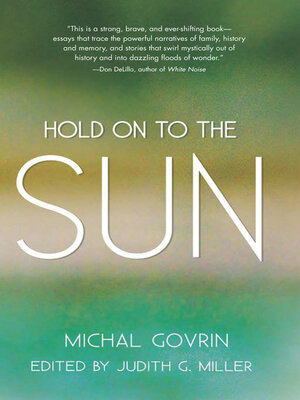
Sign up to save your library
With an OverDrive account, you can save your favorite libraries for at-a-glance information about availability. Find out more about OverDrive accounts.
Find this title in Libby, the library reading app by OverDrive.



Search for a digital library with this title
Title found at these libraries:
| Library Name | Distance |
|---|---|
| Loading... |
The Israeli author’s poetry, essays, and stories on the haunting legacy of WWII “swirl mystically out of history and into dazzling floods of wonder” (Don DeLillo, author of White Noise).
In this portrait of the artist as a young woman, one of Israel’s most acclaimed contemporary writers weaves together a kaleidoscope of fiction, poetry, and essays. Populated by both fictional and real people, each tale is in some way a search for meaning in a post-Holocaust world.
Reminiscent of W.G. Sebald, characters irrationally and humanely find reason for hope in a world that offers little. Essays describe Govrin’s visits to Poland as a young adult, where her mother had survived a death camp, but had lost her husband and their child, Govrin’s half-brother. Capturing the depths of denial and the exuberance of youth in a multiplicity of voices, this haunting collection “joins the few serious books that try through artistic means to face the unspeakable” (Aharon Appelfield, author of Badenheim 1939).
In this portrait of the artist as a young woman, one of Israel’s most acclaimed contemporary writers weaves together a kaleidoscope of fiction, poetry, and essays. Populated by both fictional and real people, each tale is in some way a search for meaning in a post-Holocaust world.
Reminiscent of W.G. Sebald, characters irrationally and humanely find reason for hope in a world that offers little. Essays describe Govrin’s visits to Poland as a young adult, where her mother had survived a death camp, but had lost her husband and their child, Govrin’s half-brother. Capturing the depths of denial and the exuberance of youth in a multiplicity of voices, this haunting collection “joins the few serious books that try through artistic means to face the unspeakable” (Aharon Appelfield, author of Badenheim 1939).







